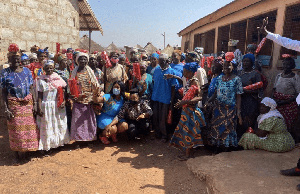Regional News of Wednesday, 29 December 2021
Source: GNA
Ahmadiyya Women's Wing donates to Gambaga Witches Camp
Lajna Imaillah Ghana, the Women’s Wing of the Ahmadiyya Muslim Mission, has presented assorted items to the Gambaga Witches Camp in the East Mamprusi Municipality of the North East Region.
The items included three bags of rice, cooking oil, different brands of soap, toiletries, boxes of canned fish and an undisclosed amount of money to support their upkeep.
Hajia Anisa Iddrisu Sahiba, the National President of Lajna Imaillah Ghana, in an interview with the Ghana News Agency (GNA) after the presentation, said the gesture was part of activities of the Welfare Secretariat of the wing.
She said the duty of the Secretariat was not only to perform Welfare activities within the Ahmadiyya community but also extended love and care to non-Ahmadiyya communities as a service to mankind according to the doctrine of Islam.
“This is service to mankind and we believe that service to Allah is service to humanity. Service to mankind is prime in our objective, and that is just what we have come to fulfil,” the Mission Women’s President, who was in the company of some National and Zonal Executives, said.
Hajia Sahiba called for support for the Camp, saying, “They need our support, as we visited them, we realised they were almost running out of food. So we are calling on benevolent organisations to come to the aid of these women.”
The National President and her executives encouraged the women at the Camp.
She said from their interactions, they realised most of the women were mothers, who had brought up and trained children expected to fit into society before they were accused of witchcraft.
“So they have contributed tremendously to society and if they found themselves in this situation, I think society needs to come to their aid so that they can also enjoy life,” Hajia Sahiba added.
Mr Samson Laar, the ‘Go Home’ Project Coordinator at the Gambaga Witches Camp, who received the items, thanked the Lajna Imaillah for the gesture and noted that it was the first time a Muslim organisation extended support to the Camp.
Mr Laar said the Camp was established in 1900 and currently had 91 people, comprising 88 women and three men, accused of witchcraft and said feeding and health care were major challenges at the Camp.
The Project Coordinator said the Camp also accommodated and cared for 31 children who were not accused of witchcraft but were sons and daughters of the accused witches.
He said out of the number of children, 26 were in school.
“Is not an easy task to feed all these people. I want to use this opportunity to appeal to members of the public to assist the Camp with food and health care services.”
On the ‘Go Home’ project, Mr Laar said the project started in 1994 and was intended to ensure that the women at the Camp were reintegrated into society.
“Anyone who wants to go home, we will facilitate and get the person back home peacefully,” he added.
Entertainment










